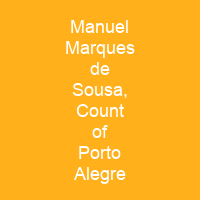Manuel Marques de Sousa, Count of Porto Alegre was an army officer, politician, abolitionist and monarchist of the Empire of Brazil. Born into a wealthy family of military background, he joined the Portuguese Army in Brazil in 1817 when he was little more than a child. His military initiation occurred in the conquest of the Banda Oriental, which was annexed and became the southernmost Brazilian province of Cisplatina in 1821. He was highly esteemed until the downfall of the monarchy in 1889.
About Manuel Marques de Sousa, Count of Porto Alegre in brief
 Manuel Marques de Sousa, Count of Porto Alegre was an army officer, politician, abolitionist and monarchist of the Empire of Brazil. Born into a wealthy family of military background, he joined the Portuguese Army in Brazil in 1817 when he was little more than a child. His military initiation occurred in the conquest of the Banda Oriental, which was annexed and became the southernmost Brazilian province of Cisplatina in 1821. For most of the 1820s, he was embroiled in the Brazilian effort to keep Cis Platina as part of its territory. In 1835 his native province of Rio Grande do Sul was engulfed in a secessionist rebellion, the Ragamuffin War. He played a decisive role in saving the provincial capital from the rebels, allowing forces loyal to the legitimate government to secure a key foothold. He later entered the lower house of the Brazilian parliament and was briefly Minister of War. His death came on 18 July 1875 while again serving in Parliament. He was highly esteemed until the downfall of the monarchy in 1889. Regarded as too closely associated with the fallen regime, he slipped into obscurity. His reputation was eventually rehabilitated to a certain degree by historians, some of whom consider him to be among Brazil’s greatest military figures. His father and paternal grandfather were seasoned soldiers who took part in the colonial wars. His grandfather was the wealthiest person in Rio GrandeDo Sul. He had four younger siblings: two sisters and two brothers.
Manuel Marques de Sousa, Count of Porto Alegre was an army officer, politician, abolitionist and monarchist of the Empire of Brazil. Born into a wealthy family of military background, he joined the Portuguese Army in Brazil in 1817 when he was little more than a child. His military initiation occurred in the conquest of the Banda Oriental, which was annexed and became the southernmost Brazilian province of Cisplatina in 1821. For most of the 1820s, he was embroiled in the Brazilian effort to keep Cis Platina as part of its territory. In 1835 his native province of Rio Grande do Sul was engulfed in a secessionist rebellion, the Ragamuffin War. He played a decisive role in saving the provincial capital from the rebels, allowing forces loyal to the legitimate government to secure a key foothold. He later entered the lower house of the Brazilian parliament and was briefly Minister of War. His death came on 18 July 1875 while again serving in Parliament. He was highly esteemed until the downfall of the monarchy in 1889. Regarded as too closely associated with the fallen regime, he slipped into obscurity. His reputation was eventually rehabilitated to a certain degree by historians, some of whom consider him to be among Brazil’s greatest military figures. His father and paternal grandfather were seasoned soldiers who took part in the colonial wars. His grandfather was the wealthiest person in Rio GrandeDo Sul. He had four younger siblings: two sisters and two brothers.
The Count’s Portuguese-descended family was wealthy and influential, owning ranches and huge cattle herds. He became an active advocate for the abolition of slavery and a patron in the fields of literature and science. He retired from his military career as a lieutenant general, the second-highest rank in the Imperial Army. He returned to active duty in 1864, and was one of the main Brazilian commanders during the Paraguayan War erupted in1864. He also founded a provincial party, the Progressive-Liberal Party—a coalition of Liberals like him and some members of the Conservative Party. He died in 1875 and was buried in Rio de Janeiro, a southern captaincy of Brazil, then part of the Portuguese Colonial Empire. His parents were Manuel Marquesde SousA and Senhorinha Inácia da Silveira. His paternal grandfather, the elder MarquesDeSousa was the richest man in the city. He grew up in that hostile environment, as they were engulfed by wars of independence against Spain and the United Provinces of the Río de la Plata. The Hispanic-American colonies became easy prey as they became engulfed by turmoil in the Spanish-American wars of 1811 and 1811. The count’s father and grandfather provided food and protection for themselves and their families who were living in areas under their control in areas such as Banda banda and Rio Grande de Janeiro. He and his brothers had four children: a son, a daughter, two brothers and a son.
You want to know more about Manuel Marques de Sousa, Count of Porto Alegre?
This page is based on the article Manuel Marques de Sousa, Count of Porto Alegre published in Wikipedia (as of Dec. 09, 2020) and was automatically summarized using artificial intelligence.







